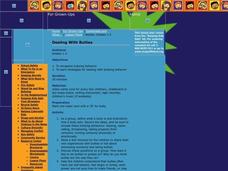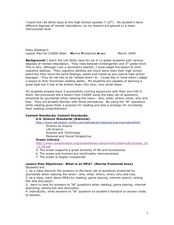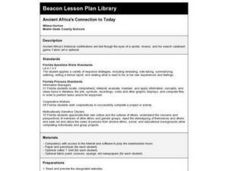Curated OER
Dealing With Bullies
Students recognize bullying behavior. They learn strategies for dealing with bullying behavior
Curated OER
Dealing With Bullies
Learners identify bullying behaviors and identify strategies for dealing with bullies. They participate in role-plays and discuss the experience later as a group. After role-playing scenarios provided by the teacher, students create...
Curated OER
Homophone Game
Students participate in a game that deals with homophones. They review the rules to the game and work in teams to run up to the board and write two more versions to each homograph called out by the teacher. All team members participate...
Curated OER
Peace Corps Challenge Game- Water Quality
Students advocate for clean water. In this water pollution lesson plan, students play the Peace Corps Challenge Game, discuss the effects of polluted water and write a letter to the mayor of Wanzuzu highlighting the situation of...
Peace Corps
Brief Encounters
How are Pandyas different than Chispas? Explore cultural norms and societal behaviors with an engaging role-play activity. Split into groups of two hypothetical cultural groups, the formal Pandyas and the sociable Chispas, and another...
Curated OER
Hector's World - Lesson Plan: Episode 4 - "The Info Gang"
Students watch an online video to equip themselves with strategies for dealing with people who they feel are untrustworthy. In this web safety lesson, students watch a video about how unsafe situations and untrustworthy people make them...
Curated OER
The Surreal Deal
Students examine the art-historical contexts used by Salvador Dali and identify examples of them. They explore surrealism by playing the game Exquisite Corpse, automatic writing or drawing, and dream illustration. They tour the Dali Museum.
Curated OER
Oops!
A sweet instructional activity on social behavior is here for you and your very young learners. Pupils discuss embarrassing things that have happened to them at school, and how it made them feel to be teased about them. After deciding...
Curated OER
Avoiding Reality
Eighth graders examine the trait of perseverance. In this character education lesson, 8th graders discuss how to deal with reality. Students consider how to help others facing difficult situations.
Curated OER
Whose Feat?
Play a vocabulary game with words from an article about Savion Glover's contribution to the film "Happy Feet." Then, small groups of students design and create original movie advertisements using vivid vocabulary to give Glover the...
Curated OER
Language: Has the Cat Got Your Tongue?
Use funny tongue twisters to entice your young learners! They'll love this game where they face off against members of the other team and recite tongue twisters. Who will win this enunciation and pronunciation competition!
Curated OER
CULTURAL ACCEPTANCE
Learners witness first hand what it feels like to be discriminated against.
Curated OER
Similar and Different
Fourth graders observe a pair of students standing in front of the class and compare and contrast them using a Venn Diagram using these guidelines: eye color, hair color, older/younger, tallest/shortest, gender, favorite food, favorite...
Curated OER
Marine Protection Areas
Students explain the importance of having Marine Protected Areas. In this ecology lesson, students research MPA's in any of the Great Lakes. They play a MPA simulation game and identify MPA's on the map.
Curated OER
Lonely Heart
Pupils play a game to improve non-verbal communication skills. They each place a playing card on their forehead without looking at the suit then they must form groups of the same suit without speaking. They reflect on the process and...
Curated OER
Cultural Acceptance
Students are segregated into groups according to their clothing and experience first hand what it feels like to be a minority in everyday life. For this cultural acceptance lesson plan, students experience discrimination first hand....
Curated OER
Divide and Conquer: Breaking Down Skills For Slowlearners
Students are introduced to skills to help them become better readers. With a partner, they use magazines to identify consonant pairs and participate in a game naming words that ends with consonants. As a class, they practice clapping...
Curated OER
Ancient Africa's Connection to Today
Fourth graders engage in a lesson in which ancient Africa's historical contributions are told though the eyes of a spider, Anansi, and his search calabash game. The game is accessed through a website which is embedded in this lesson plan.
Curated OER
Enemy Pie
Students complete activities with the book Enemy Pie by Derek Munson. In this literature instructional activity, students answer questions before and during the reading. They describe how the main character's feelings changed.
Curated OER
Radio Broadcasting Before Television
Students compare the radio to other forms of mass communication. In this Radio Broadcasting Before Television lesson, students learn the different types of radio shows in the 1920s and 30s. Students write and perform radio scripts...
National First Ladies' Library
Don't Be a Duffer! Understanding the Sport of Golf
Students are divided into six groups to access the "History of Golf Since 1497" website, and familiarize themselves with the data on one of the six pages of the website. They then work together as a large group to construct a timeline of...
Curated OER
Outside the In-Group
Students pretend they are the person who is kept out of a group. As a class, they examine the behaviors of each person in a group situation and discuss how the role-play made them feel. They examine situations in which they kept...
Curated OER
On 'Punched Out': Looking at Brain Trauma and Other Risks of Violent Sports
The tragic story of Derek Boogard, a hockey star whose sports-related brain injuries eventually lead to his death, is told through a series of videos. There are also articles that can be read. This poignant instructional activity gets...
Curated OER
Dating and Emotions
Learners explain how four areas of self-disclosure affect relationships. They evaluate their own comfort levels for self-disclosure. They identify components of communication.























